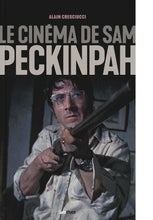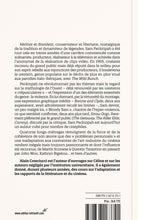The Cinema of Sam Peckinpah
of Alain Cresciucci
Release date : end of November 2022
Publisher : Editions Lett Motif
Language : French
Number of pages : 300 pages / 60 photos
Heir and dissident, conservative and libertarian, nostalgic for tradition and blaster of legends, Sam Peckinpah has been all this in thirty years of a career that began as a screenwriter, producer, television director and ended in the anonymity of the realization of video clips. In 1969, a filmmaker unknown to the general public but already renowned in the milieu for his rebellious spirit at the injunctions of producers, he upset the western, a popular genre on the decline increasingly devoted to Italo-Iberian parodies, with The Wild Bunch . Peckinpah did not revolutionize the themes but the look at the mythology of the West – already renewed by the “twilight” westerns – and the expression of one of the essential elements of the genre: violence. By giving it, through the virtuosity of the editing, an unprecedented graphic expression – Bonnie and Clyde , two years earlier, had skilfully pushed back the limits – Sam became, somewhat in spite of himself, “Bloody Sam”, a champion of hyper-violence, which seemed to confirm, two years later, Straw Dogs . Rarely acclaimed by the general public ( The Getaway, The Killer Elite, Convoy ), discussed by critics, Sam Peckinpah is today a cult author for many moviegoers. Fourteen feature films bear witness to the strength and coherence of his work, which “personal problems” and a lack of adaptation to the constraints of the art-cinema industry make uneven but always fascinating and whose influence is recognized, by Martin Scorsese to Quentin Tarantino via John Woo, Kathryn Bigelow… and many others.
Alain Cresciucci is the author of works on Céline and on the authors neglected by the university institution. For several years, he also gave courses on the adaptation and relationship between literature and cinema.




